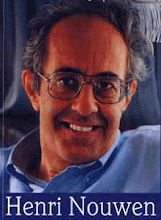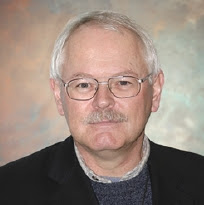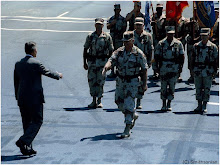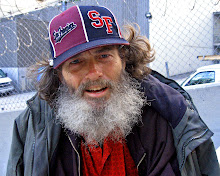I first saw the woman in the early morning hours, as she stretched out on a bus stop bench at the Brea Mall.
She was what people would refer to as a bag lady. She had a two wheeled push carts filled with her belongings. She was layered in tattered clothing. Her legs were swollen and wrapped in what I would later find out were tampons to absorb the fluids oozing from open sores. She appeared to be asleep, mumbling to herself in an apparent nightmare.
As I watched, standing nearby with some restaurant workers who had just gotten off work, she woke up and started screaming: "Stop attacking me, you damn Mexicans!" We all took a few steps back and looked at each other, shaking our heads. What can you do, other than ignore this person's anguish?
What are you gonna do? I had my own problems.
A year earlier, while riding a bicycle in Long Beach, I had been struck by a van. I had no health insurance, and the guy who hit me didn't have car insurance or money. I got stuck with a $115,000 hospital bill for a month's stay. The docs had done a great job patching me up. I had residual pain from the back injuries and the torn rotator cuff, but I had learned how to meditate the pain away without pain killers.
I recovered while living in a tent next to the 605 Freeway. I was – and am – lucky to be alive. And I decided, in an attempt to make sense of my survival, to dedicate a year of my life to working charity. I found a shelter in Orange County and started volunteering my time. By day, I helped feed the hungry and house homeless women. By night, I slept on the streets.
I started seeing the bag lady from the mall again.
She smelled like death, probably from the leg wounds. She'd rant at anybody unlucky enough to sit near her, calling them child molesters and drug dealers. She pointed at me one time, ranting. Selfishly, I took offense and responded.
"You don't have any friends, do you? Your family won't talk to you, will they? One of these days you're gonna say the wrong thing to the wrong person, and they're gonna follow you off the bus and whack you over the head to put an end to your miserable life!"
I could see she was hurt, but I didn't stop. "And you know what? The world will be better off for it." I got off the bus, feeling horrible over what I had just said.
Eventually I started working at the shelter every day. I slept in the kitchen, making it easier to put breakfast on for the women who stayed there.
I put on a good spread and kept a spotless kitchen. It made sense out of my survival; made the challenges I faced in my own recovery worth the effort. And the women at the shelter appreciated my work. These women, many rejected by their own friends and family, became like sisters to me. I knew what rejection felt like. It was our bond.
One morning, as I lifted the partition over the breakfast counter, I saw the bag lady from the mall staring up at me. She had shown up at the shelter, looking for a place to get out of the cold, and she quickly became a regular.
At first, we didn't talk. Each morning, I would lift the partition and there she would be, staring. Eventually, I'd say "mornin'" and she would nod an acknowledgment.
The people who ran the shelter placed her in the garage to sleep with some of the other women staying there. It was warmer than sleeping in the backyard, where many of the other women slept.
One night, I was passing by the garage when I heard laughter. I opened up the side door and bellowed with mock authority "What's going on in here!?"
There was the bag lady, almost in tears from laughing, telling jokes. It was almost like I was witnessing a miracle. A warm human being was peeking out from behind that street mask of filth and insanity.
Something needed to be done about her legs. The best we could do was to have a social worker get her admitted to the psychiatric ward of a local hospital. At least she could start taking medication for her delusions and get her wounds cleaned.
But it was Christmas season, and a psych ward isn't much of a place for Christmas cheer. So I started visiting her daily, spending a couple of hours at a time, shooting the breeze.
We would talk about places to eat, our favorite buses to ride, our favorite bus stops to hang out at; places we had been. The medical staff started calling me her "son". I didn't correct them.
From the hospital we got her into a rest home. There she would spend the next several months in relative safety and comfort.
I continued to visit as often as I could. . . I'd tell her that I didn't want her to die cold and alone on the streets. Finally, one day, after I had once again told her that I thought she was better off in the home, she told me that she didn't want me to come around anymore.
It broke my heart, but I honored her wish. . . That was the last time I saw her.
As my bus pulled away from the Transportation Center I saw her fade from my sight. A tear came to my eye. I didn't want her to die alone on the streets, but that's where she wanted to be.
What are you gonna do?
Contact the writer: Michael Valencia, 45, first published this story special to the Orange County Register. He has been living on the streets and in shelters for most of the past five years. He currently is staying at a shelter in Los Alamitos and working, on a volunteer basis, at the Southern California Indian Center in Fountain Valley. He can be reached via email at valenciamichael66@yahoo.com.
______________
* Invite your family and friends to Subscribe! to Homeless In America.
* Scroll down to the bottom of the page and vote in the polls.
* List yourself as a blog follower, middle right column.
* Donate! to the poor homeless deliveries of food, water, clothing, blankets, socks, underwear, soap, shampoo, toothbrushes and toothpaste, pocket Bibles, rosaries and prayer cards at
http://servantsofthefather.org/donate_2_homeless* Post checks to - Servants of the Father of Mercy, Inc., P.O. Box 42001, Los Angeles, CA 90042. All Donations are Tax Deductible.




 On Wednesday, January 26, 2011, Homeless In America blogged a story that some people are chilled to the idea that wearing an ice cream logo can help keep the homeless warm. Some homeless now have commercial sponsors: they're sporting warm winter jackets with logos for Ben & Jerry's ice cream helping to raise money for a bunch of nuns who aid the needy. Should companies give for the sake of giving instead of treating the homeless like a NASCAR racer blanketed in an avalanche of logos?
On Wednesday, January 26, 2011, Homeless In America blogged a story that some people are chilled to the idea that wearing an ice cream logo can help keep the homeless warm. Some homeless now have commercial sponsors: they're sporting warm winter jackets with logos for Ben & Jerry's ice cream helping to raise money for a bunch of nuns who aid the needy. Should companies give for the sake of giving instead of treating the homeless like a NASCAR racer blanketed in an avalanche of logos?

























